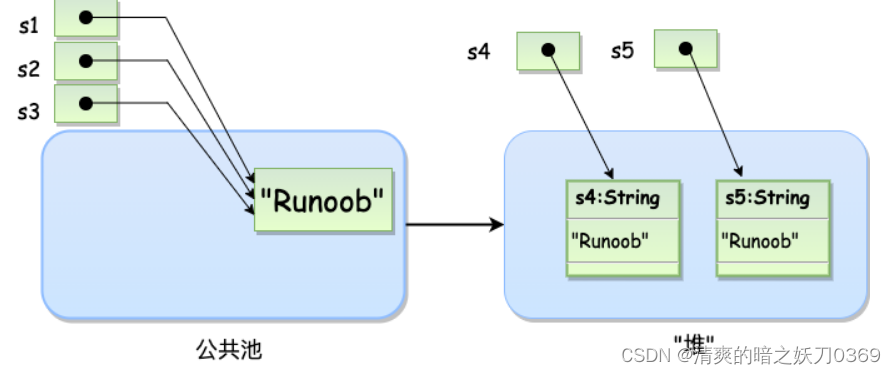java基础之String类
1、概念
字符串广泛应用 在 Java 编程中,在 Java 中字符串属于对象,Java 提供了 String 类来创建和操作字符串。
2、创建
1、直接创建:String str = "asdf";
2、构造函数创建:String str2=new String("asdf");
区别:
String 创建的字符串存储在公共池中,而 new 创建的字符串对象在堆上。
3、String 方法
下面是 String 类支持的方法,更多详细,参看 Java String API 文档:
| SN(序号) | 方法描述 |
|---|---|
| 1 | char charAt(int index) 返回指定索引处的 char 值。 |
| 2 | int compareTo(Object o) 把这个字符串和另一个对象比较。 |
| 3 | int compareTo(String anotherString) 按字典顺序比较两个字符串。 |
| 4 | int compareToIgnoreCase(String str) 按字典顺序比较两个字符串,不考虑大小写。 |
| 5 | String concat(String str) 将指定字符串连接到此字符串的结尾。 |
| 6 | boolean contentEquals(StringBuffer sb) 当且仅当字符串与指定的StringBuffer有相同顺序的字符时候返回真。 |
| 7 | static String copyValueOf(char[] data) 返回指定数组中表示该字符序列的 String。 |
| 8 | static String copyValueOf(char[] data, int offset, int count) 返回指定数组中表示该字符序列的 String。 |
| 9 | boolean endsWith(String suffix) 测试此字符串是否以指定的后缀结束。 |
| 10 | boolean equals(Object anObject) 将此字符串与指定的对象比较。 |
| 11 | boolean equalsIgnoreCase(String anotherString) 将此 String 与另一个 String 比较,不考虑大小写。 |
| 12 | byte[] getBytes() 使用平台的默认字符集将此 String 编码为 byte 序列,并将结果存储到一个新的 byte 数组中。 |
| 13 | byte[] getBytes(String charsetName) 使用指定的字符集将此 String 编码为 byte 序列,并将结果存储到一个新的 byte 数组中。 |
| 14 | void getChars(int srcBegin, int srcEnd, char[] dst, int dstBegin) 将字符从此字符串复制到目标字符数组。 |
| 15 | int hashCode() 返回此字符串的哈希码。 |
| 16 | int indexOf(int ch) 返回指定字符在此字符串中第一次出现处的索引。 |
| 17 | int indexOf(int ch, int fromIndex) 返回在此字符串中第一次出现指定字符处的索引,从指定的索引开始搜索。 |
| 18 | int indexOf(String str) 返回指定子字符串在此字符串中第一次出现处的索引。 |
| 19 | int indexOf(String str, int fromIndex) 返回指定子字符串在此字符串中第一次出现处的索引,从指定的索引开始。 |
| 20 | String intern() 返回字符串对象的规范化表示形式。 |
| 21 | int lastIndexOf(int ch) 返回指定字符在此字符串中最后一次出现处的索引。 |
| 22 | int lastIndexOf(int ch, int fromIndex) 返回指定字符在此字符串中最后一次出现处的索引,从指定的索引处开始进行反向搜索。 |
| 23 | int lastIndexOf(String str) 返回指定子字符串在此字符串中最右边出现处的索引。 |
| 24 | int lastIndexOf(String str, int fromIndex) 返回指定子字符串在此字符串中最后一次出现处的索引,从指定的索引开始反向搜索。 |
| 25 | int length() 返回此字符串的长度。 |
| 26 | boolean matches(String regex) 告知此字符串是否匹配给定的正则表达式。 |
| 27 | boolean regionMatches(boolean ignoreCase, int toffset, String other, int ooffset, int len) 测试两个字符串区域是否相等。 |
| 28 | boolean regionMatches(int toffset, String other, int ooffset, int len) 测试两个字符串区域是否相等。 |
| 29 | String replace(char oldChar, char newChar) 返回一个新的字符串,它是通过用 newChar 替换此字符串中出现的所有 oldChar 得到的。 |
| 30 | String replaceAll(String regex, String replacement) 使用给定的 replacement 替换此字符串所有匹配给定的正则表达式的子字符串。 |
| 31 | String replaceFirst(String regex, String replacement) 使用给定的 replacement 替换此字符串匹配给定的正则表达式的第一个子字符串。 |
| 32 | String[] split(String regex) 根据给定正则表达式的匹配拆分此字符串。 |
| 33 | String[] split(String regex, int limit) 根据匹配给定的正则表达式来拆分此字符串。 |
| 34 | boolean startsWith(String prefix) 测试此字符串是否以指定的前缀开始。 |
| 35 | boolean startsWith(String prefix, int toffset) 测试此字符串从指定索引开始的子字符串是否以指定前缀开始。 |
| 36 | CharSequence subSequence(int beginIndex, int endIndex) 返回一个新的字符序列,它是此序列的一个子序列。 |
| 37 | String substring(int beginIndex) 返回一个新的字符串,它是此字符串的一个子字符串。 |
| 38 | String substring(int beginIndex, int endIndex) 返回一个新字符串,它是此字符串的一个子字符串。 |
| 39 | char[] toCharArray() 将此字符串转换为一个新的字符数组。 |
| 40 | String toLowerCase() 使用默认语言环境的规则将此 String 中的所有字符都转换为小写。 |
| 41 | String toLowerCase(Locale locale) 使用给定 Locale 的规则将此 String 中的所有字符都转换为小写。 |
| 42 | String toString() 返回此对象本身(它已经是一个字符串!)。 |
| 43 | String toUpperCase() 使用默认语言环境的规则将此 String 中的所有字符都转换为大写。 |
| 44 | String toUpperCase(Locale locale) 使用给定 Locale 的规则将此 String 中的所有字符都转换为大写。 |
| 45 | String trim() 返回字符串的副本,忽略前导空白和尾部空白。 |
| 46 | static String valueOf(primitive data type x) 返回给定data type类型x参数的字符串表示形式。 |
| 47 | contains(CharSequence chars) 判断是否包含指定的字符系列。 |
| 48 | isEmpty() 判断字符串是否为空。 |

